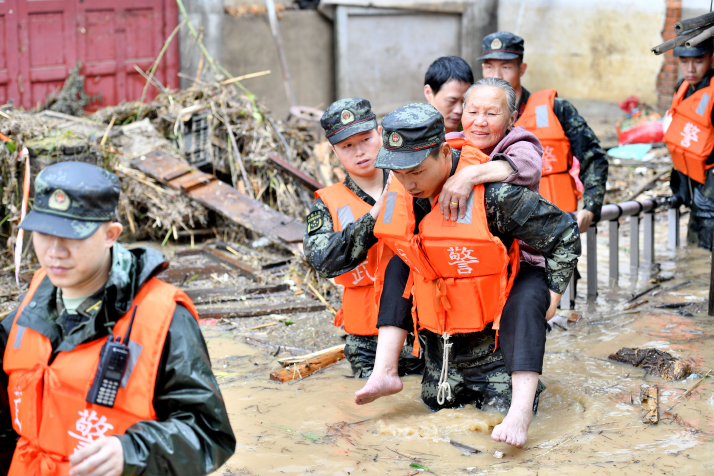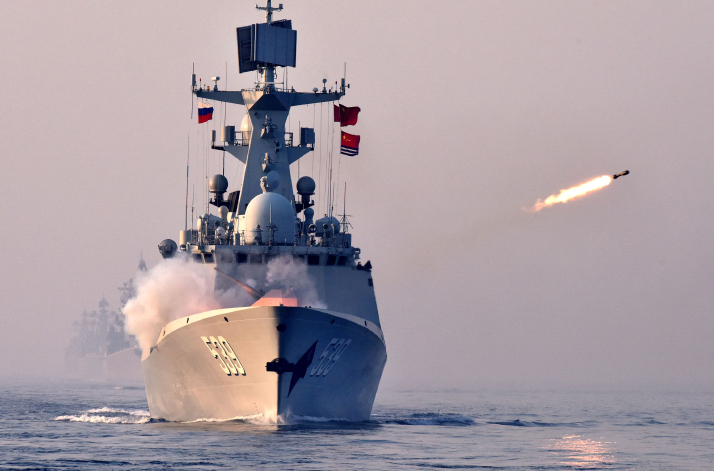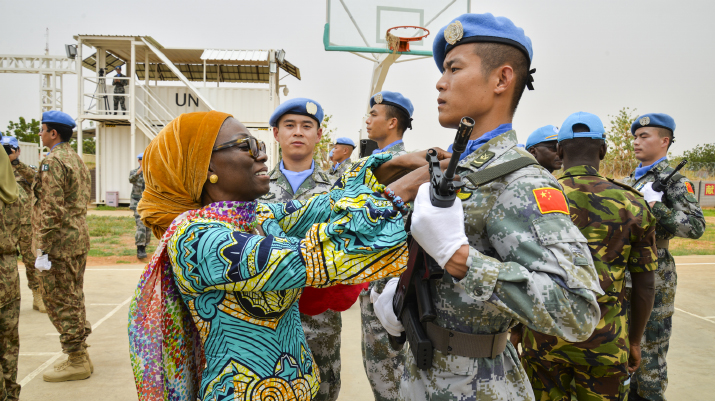| China |
| Serving Peace and Justice | |
| New white paper describes national defense policy in the new era | |
|
|
 Officers and soldiers of an armed police force unit rescue and transfer a senior resident stranded in a flood in Yongan, southeast China's Fujian Province, on May 17 (XINHUA)
For the first time, the phrase "never seeking hegemony, expansion or spheres of influence" has been added to a government white paper as a distinctive feature of China's national defense in the new era. The report, under the title China's National Defense in the New Era, was released by the State Council Information Office on July 24. Zhao Dexi, a researcher with the Academy of Military Science of the Chinese People's Liberation Army (PLA) and one of the authors of the white paper, said the statement is a solemn commitment China makes to the world. According to Zhao, a few countries actively hype the "China threat" rhetoric for the purpose of containing and clamping down on China, but some countries believe it and worry that China will follow the beaten track of big powers in seeking hegemony. To clear the air, ease doubts and enhance mutual trust, the new white paper added the phrase and declared that China will never inflict suffering—such as the Chinese people endured from aggressions and wars—on any other country. The development of China's national defense aims to meet its rightful security needs and contribute to the growth of the world's peace forces. Clear positions The white paper is the 10th on the county's national defense since 1998 and the first since the 18th National Congress of the Communist Party of China (CPC) in 2012, which called on the country to accelerate the modernization of its national defense and armed forces. Its main texts are divided into six chapters which cover the international security situation, China's defensive national defense policy in the new era, the missions and tasks of China's armed forces in the new era, reform in national defense and armed forces, defense expenditure and international military cooperation. The white paper objectively analyzes the international security situation and China's security environment, noting that the world today is undergoing profound changes unseen in a century, with prominent destabilizing factors and uncertainties in international security, Wu Qian, a spokesperson for the Ministry of National Defense (MND), said at a press conference in Beijing on the day of its release. Despite obstacles, the pursuit of peace, stability and development has become the universal aspiration of the international community, with forces for peace predominating over elements of war. Peace, development and win-win cooperation remain the irreversible trend of the times. The report points out that the Asia-Pacific security situation remains generally stable. China continues to enjoy political stability, ethnic unity and social stability, but also faces diverse and complex security threats and challenges, especially as the fight against separatist elements becomes more acute. "The fundamental goal of China's national defense today is to resolutely safeguard its sovereignty, security and development interests," Zhao said. China has also made efforts to deepen bilateral and multilateral security cooperation, promote a coordinated, inclusive and complementary cooperation among security mechanisms. These endeavors are beneficial for the international community to recognize, understand and support China's national defense policy, especially its military and security strategies, according to Zhao. The white paper also points out that China exercises its national sovereignty to build infrastructure and deploy necessary defensive capabilities on the islands and reefs in the South China Sea, as well as to conduct patrols in the waters of the Diaoyu Islands in the East China Sea. China firmly upholds the freedom of navigation and overflight by all countries in accordance with international law, and safeguards the security of sea lines of communication, the document states. It safeguards its maritime rights and interests, security interests in outer space, electromagnetic space and cyberspace, and overseas interests. "Countries are developing relative forces in these fields and some are for military use. The white paper states China's policy and solutions, which are beneficial for both maintaining national development interests and contributing to safeguarding world peace and development," Zhao said.  A Chinese guided missile frigate fires a rocket during the China-Russia Joint Sea 2019 military exercise off China's coast on May 3 (XINHUA)
Persistent reforms Chen Yue, an associate researcher with the PLA Academy of Military Science and another of the authors of the white paper, said the document, with a distinct epochal character, is comprehensive and innovative and serves as an assertion of China's goal to resolutely safeguard its sovereignty and security. "China, as a power, makes the choice of sharing instead of dominating. It is therefore appealing to people's intelligence," Sonia Bressler, a French writer and sinologist, said. "This affirmation is unprecedented because it places peace at the heart of the political process." The report stresses that China's national security and development strategy require the armed forces to advocate common, comprehensive, cooperative and sustainable security, and actively participate in the reform of the global security governance system. It comprehensively introduces the scale, composition and basic usage of China's defense spending since 2012, demonstrating its openness and transparency. China's expenditure is reasonable and appropriate. Compared to other major countries, the ratios of China's defense expenditure to GDP and to government spending, as well as its per-capita defense expenditure, remain at a relatively low level. Nourhan al-Sheikh, a political science professor at Cairo University, told Xinhua News Agency, "This year's white paper really matches China's principle that hegemony and expansion are doomed to failure and security and prosperity must be shared." Historic achievements in deepening national defense and military reform, including reform of the leadership and command system, optimization of size, structure and force composition, and reform of military policies and institutions, are also reviewed in the white paper. The document describes the basic condition of the reshuffled PLA and People's Armed Police Force troops along with China's national defense and military development from its theoretical and political buildup to its military theory, weaponry, equipment and logistics, showing a new PLA after reform in 2016. The white paper states that the history of the people's armed forces is a history of reform and innovation. In the new era, China is advancing defense and military modernization across the board and deepening reform in national defense and the armed forces in all respects, with a focus on removing institutional barriers and solving structural and policy-related problems to adapt to the trends of the worldwide Revolution in Military Affairs and the demands of national security. "Reform is the key to China's future and to the development of its military. The white paper thoroughly describes the state of national defense and the military after reform, and responds to domestic and international concerns on China's military reform. It shows a sound picture of an innovative, confident and transparent PLA," Wang Jianfei, a research assistant with the PLA Academy of Military Science, told Xinhua News Agency.
 Anita Kiki Gebe (left), deputy joint special representative of the United Nations-African Union Mission in Darfur, awards the UN Peace Medal to a soldier of the Second China Medium Utility Helicopter Unit in El-Fashir, Sudan, on July 17 (XINHUA)
Safeguarding peace The white paper also shows how China's armed forces are fulfilling their missions and tasks in the new era. It states that they aim to provide strategic support for consolidating the leadership of the CPC and the socialist system. The document reviews the use of the armed forces from seven aspects: safeguarding national territorial sovereignty and maritime rights and interests; maintaining combat readiness; carrying out military training in real combat conditions; safeguarding interests in major security fields; countering terrorism and maintaining stability; protecting China's overseas interests; and participating in disaster rescue and relief. New and hi-tech weaponry and equipment such as Type 15 tanks, Type 052D destroyers, J-20 fighters and DF-26 intermediate and long-range ballistic missiles are introduced in the white paper, showing that China's armed forces are optimizing the overall composition of weaponry and equipment as old equipment is being phased out. The progress in independent innovation in some strategic, cutting-edge and disruptive technologies ensures the improved capabilities of China's national defense in completing its missions and tasks. Moreover, the white paper describes the hard work and major contributions China's military has made toward world peace, stability and the building of a community with a shared future for humanity from five aspects: resolutely upholding the purposes and principles of the UN Charter; building a new-model security partnership featuring equality, mutual trust and win-win cooperation; building a regional security cooperation architecture; properly coping with disputes over territory and maritime demarcation; and actively providing international public security goods. "The role of the military all over the world is more or less the same, territorial defense. But what makes the PLA different is that it now has two new roles: protecting China's overseas interests and safeguarding international peace," Zhou Bo, Director of the Center for Security Cooperation at the Office for International Military Cooperation of the MND, told China Global Television Network, noting that China is now a global China, especially since 140 million Chinese people go abroad every year and it has huge overseas investments. "The PLA's motto is to serve the people, but in the 21st century, who are the people? It's not only the Chinese people anymore, it's all the people all over the world," Zhou said. Copyedited by Rebeca Toledo Comments to luyan@bjreview.com |
|
||||||||||||||||||||||||||||||
|
